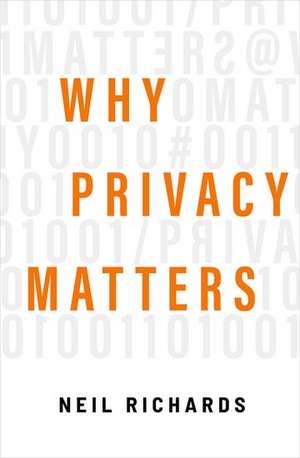Why Privacy Matters
Autor Neil Richardsen Limba Engleză Hardback – 10 mar 2022
Preț: 159.82 lei
Preț vechi: 182.47 lei
-12% Nou
Puncte Express: 240
Preț estimativ în valută:
30.58€ • 31.99$ • 25.40£
30.58€ • 31.99$ • 25.40£
Carte disponibilă
Livrare economică 01-07 martie
Livrare express 26 februarie-04 martie pentru 52.50 lei
Preluare comenzi: 021 569.72.76
Specificații
ISBN-13: 9780190939045
ISBN-10: 0190939044
Pagini: 304
Dimensiuni: 164 x 242 x 29 mm
Greutate: 0.52 kg
Editura: Oxford University Press
Colecția OUP USA
Locul publicării:New York, United States
ISBN-10: 0190939044
Pagini: 304
Dimensiuni: 164 x 242 x 29 mm
Greutate: 0.52 kg
Editura: Oxford University Press
Colecția OUP USA
Locul publicării:New York, United States
Recenzii
Author Neil Richards captures some very thought-provoking situations and his book is an exceptionally good read. While it is not an everyday 'how to' guide for practitioners who work in the relevant field, it can certainly help seasoned practitioners, newcomers to law or those who wish to explore the deeper meaning of privacy law understand why privacy may be about power. It helps those in law understand why their client may be worried about their data being misused or misappropriated, and what those who collect our data can do with it. By understanding why privacy matters, we can better understand how to assist those seeking our help.
This thought-provoking book may inspire us to explore many theoretical ways to address privacy issues as well as create general models of protecting privacy. It is indispensable for those who wish to know more about privacy both academically and practically.
Neil Richards argues powerfully and eloquently about the importance of privacy in our lives and society. Insightful and nuanced, but also very accessible and clear, Why Privacy Matters is essential reading for anyone concerned about individual identity and freedom in a world where digital technologies are spinning out of control.
Why Privacy Matters is a terrific synthesis of the literature on privacy and surveillance. It is also an insightful contribution to our understanding of those profoundly important areas of life. Every page provides provocative grist for discussion. Richards's conception of 'the situated consumer' is especially valuable for helping scholars, policymakers, and citizens to think about the data-collection thicket that marks our twenty-first century.
Privacy is not dead: it's the only power we have in an accelerating information society. Neil Richards offers us not just a clear-sighted defense of privacy but also a wise and humane set of guidelines for protecting it. Have the 'Privacy Conversation' with Richards; you will emerge enlightened—and even inspired—about the choices we face and the rules we still can make to govern the flow of our information.
Neil Richards persuasively lays down precisely why we, humans, should and must continue to apply notions and standards of privacy and data protection—even in a seemingly all-surveilling world. While reinforcing the critical importance of current regulation, he provides timely reasoning as to why our societies and governments must equally and urgently apply energy to defining, evolving, and refining the rules that enable and maintain personal empowerment in this Information Age. This book nails the case for why 'privacy is dead' is a cop-out.
This thought-provoking book may inspire us to explore many theoretical ways to address privacy issues as well as create general models of protecting privacy. It is indispensable for those who wish to know more about privacy both academically and practically.
Neil Richards argues powerfully and eloquently about the importance of privacy in our lives and society. Insightful and nuanced, but also very accessible and clear, Why Privacy Matters is essential reading for anyone concerned about individual identity and freedom in a world where digital technologies are spinning out of control.
Why Privacy Matters is a terrific synthesis of the literature on privacy and surveillance. It is also an insightful contribution to our understanding of those profoundly important areas of life. Every page provides provocative grist for discussion. Richards's conception of 'the situated consumer' is especially valuable for helping scholars, policymakers, and citizens to think about the data-collection thicket that marks our twenty-first century.
Privacy is not dead: it's the only power we have in an accelerating information society. Neil Richards offers us not just a clear-sighted defense of privacy but also a wise and humane set of guidelines for protecting it. Have the 'Privacy Conversation' with Richards; you will emerge enlightened—and even inspired—about the choices we face and the rules we still can make to govern the flow of our information.
Neil Richards persuasively lays down precisely why we, humans, should and must continue to apply notions and standards of privacy and data protection—even in a seemingly all-surveilling world. While reinforcing the critical importance of current regulation, he provides timely reasoning as to why our societies and governments must equally and urgently apply energy to defining, evolving, and refining the rules that enable and maintain personal empowerment in this Information Age. This book nails the case for why 'privacy is dead' is a cop-out.
Notă biografică
Neil Richards is one of the world's leading experts in privacy law, information law, and freedom of expression. He holds the Koch Distinguished Professorship at Washington University School of Law, where he co-directs the Cordell Institute for Policy in Medicine & Law. He is also an affiliate scholar with the Stanford Center for Internet and Society and the Yale Information Society Project, a Fellow at the Center for Democracy and Technology, and a consultant and expert in privacy cases. Richards serves on the board of the Future of Privacy Forum and is a member of the American Law Institute. He is the author of Intellectual Privacy (Oxford).
